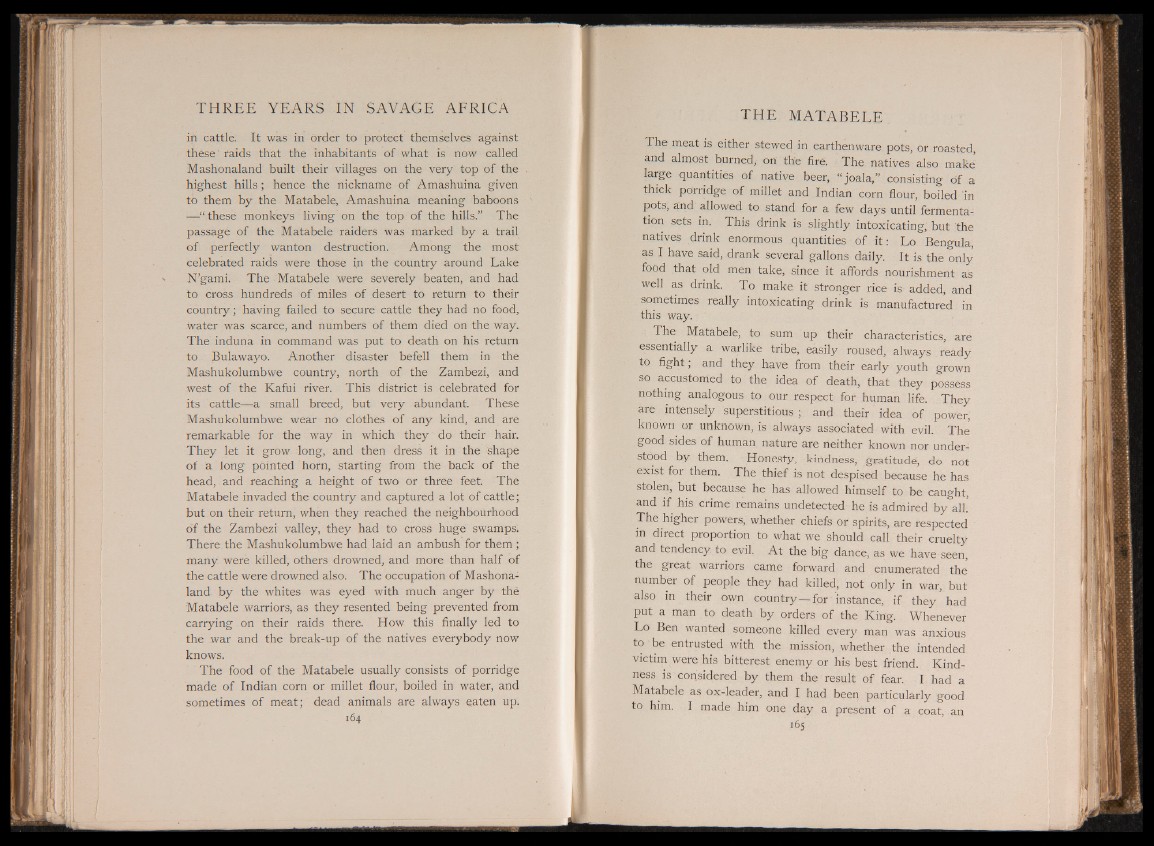
in cattle. It was in order to protect themselves against
these ' raids that the inhabitants of what is now called
Mashonaland built their villages on the very top of the
highest hills ; hence the nickname of Amashuina given
to them by the Matabele, Amashuina meaning baboons
¡¡f-" these monkeys living on the top of the hills.” The
passagé of the Matabele raiders was marked by a trail
of perfectly wanton destruction. Among the most
celebrated raids were those in the country around Lake
N’gami. The Matabele were severely beaten, and had
to cross hundreds of miles of desert to return to their
country ; having failed to secure cattle they had no food,
water was scarce, and numbers of them died on the way.
The induna in command was put to death on his return
to Bulawayo. Another disaster befell them in the
Mashukolumbwe country, north of the Zambezi, and
west of the Kafui river. This district is celebrated for
its cattle—a small breed, but very abundant. These
Mashukolumbwe wear no clothes of any kind, and are
remarkable for the way in which they do their hair.
They let it grow long, and then dress it in the shape
of a long pointed horn, starting from the back of the
head, and reaching a height of two or three feet. The
Matabele invaded the country and captured a lot of cattle ;
but on their return, when they reached the neighbourhood
of the Zambezi valley, they had to cross huge swamps.
There the Mashukolumbwe had laid an ambush for them ;
many were killed, others drowned, and more than half of
the cattle were drowned also. The occupation of Mashonaland
by the whites was eyed with much anger by thé
Matabele warriors, as they resented being prevented from
carrying on their raids there. How this finally led to
the war and the break-up of the natives everybody now
knows.
The food of the Matabele usually consists of porridge
made of Indian corn or millet flour, boiled in water, and
sometimes of meat; dead animals are always eaten up.
164
The meat is either stewed in earthenware pots, or roasted,
and almost burned, on the fire. The natives also make
large quantities of native beer, “ joala,” consisting of a
thick porridge of millet and Indian corn flour, boiled in
pots, and allowed to stand for a few days until fermentation
sets in. This drink is slightly intoxicating, but the
natives drink enormous quantities of it: Lo Bengula,
as I have said, drank several gallons daily. It is the only
food that old men take, since it affords nourishment as
well as drink. To make it stronger rice is added, and
sometimes really intoxicating drink is manufactured in
this way.
The Matabele, to sum up their characteristics, are
essentially a warlike tribe, easily roused, always ready
to fight, and they have from their early youth grown
so accustomed to the idea of death, that they possess
nothing analogous to our respect for human life. They
are intensely superstitious ; and their idea of power,
knovvn or unknown, is always associated with evil. The
good sides of human nature are neither known nor understood
by them. Honesty, kindness, gratitude, do not
exist for them. The thief is not despised because he has
stolen, but because he has allowed himself to be caught,
and if his crime remains undetected he is admired by all.
The higher powers, whether chiefs or spirits, are respected
in direct proportion to what we should call their cruelty
and tendency to evil. At the big dance, as we have seen,
the great warriors came forward and enumerated the
number of people they had killed, not only in war, but
also in their own country—for instance, if they had
put a man to death by orders of the King. Whenever
Lo Ben wanted someone killed every man was anxious
to be entrusted with the mission, whether the intended
victim were his bitterest enemy or his best friend. Kindness
is considered by them the result of fear. I had a
Matabele as ox-leader, and I had been particularly good
to him. I made him one day a present of a coat, an
m